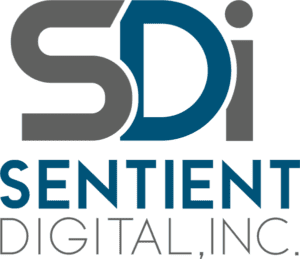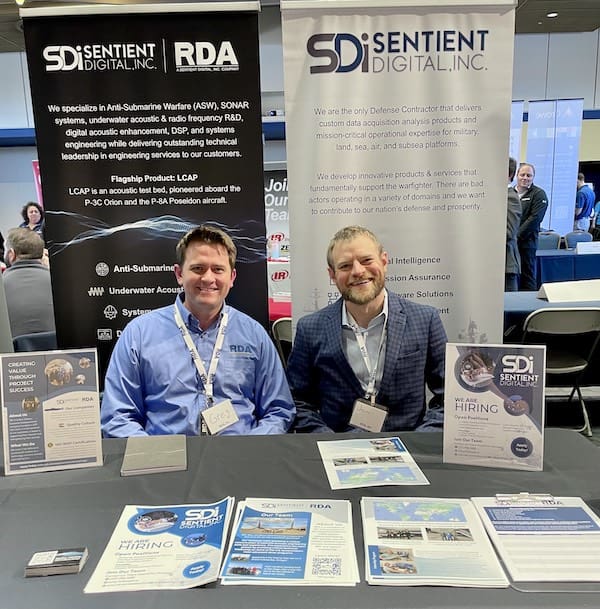University partnerships with companies can be mutually beneficial, as universities gain a relationship that can lead to employment for their graduates, and companies gain access to a highly motivated talent pool. Out of a strong belief in this principle, representatives of Sentient Digital and its subsidiary, RDA, frequently attend STEM career fairs and other university events that allow us to give back to the community while also sharing ideas relevant to our industry and meeting the students who will one day become leaders in our field.
Recently, Villanova University hosted multiple career fairs. Three representatives of our organization, Kathy Hinkle, Greg Niehaus, and Jon Stone, attended two of them, one focused on internships and another focused on engineering and technology careers. This gave them the opportunity to talk with students about our organization and learn about the students’ plans for their careers. In doing so, they forged a connection with the university that can lead to additional collaboration in the future.
Background Information on Villanova University
Located in the Villanova suburb of Philadelphia, Pennsylvania, Villanova University is a private, Catholic research university founded in 1842. Nonetheless, it is very much grounded in the 21st Century when it comes to its technology-related facilities and areas of study.
Industry-Relevant Academic Programs
When it comes to Sentient Digital and RDAs focus areas (such as systems engineering, cybersecurity, and artificial intelligence) Villanova offers programs that provide significant opportunities in these areas. Villanova’s College of Engineering’s degrees include a Bachelor of Science in Computer Engineering, as well as a minor in cybersecurity. The 20 full-time faculty members in the Department of Electrical and Computer Engineering include experts in machine learning, which is relevant to artificial intelligence, as well as signal processing and software engineering, among many other areas.
The Department of Computing Sciences, which at Villanova is in the College of Liberal Arts and Sciences, allows students to choose a Bachelor of Science in Computer Science, letting students study programming, algorithms, databases, computer architecture, and artificial intelligence. All of Villanova’s technology programs are supported by high-tech facilities and equipment.
Villanova University’s Support for Job Seekers
Helping students to build their careers is a clear priority at Villanova University, which has a full-service Career Center. With many options for job and internship search support, including career counseling, resume and cover letter guides, and networking events, the Villanova University Career Center helps students and alumni to apply for jobs, learn interview skills, and more. They also have a system that allows employers to post open jobs. However, one of the most important features of the Center for companies to note is the fact that it offers career fairs and on-campus recruiting events frequently, with representatives of many industries, including the tech industry. We were glad to participate in the career fair events to assist with these efforts.
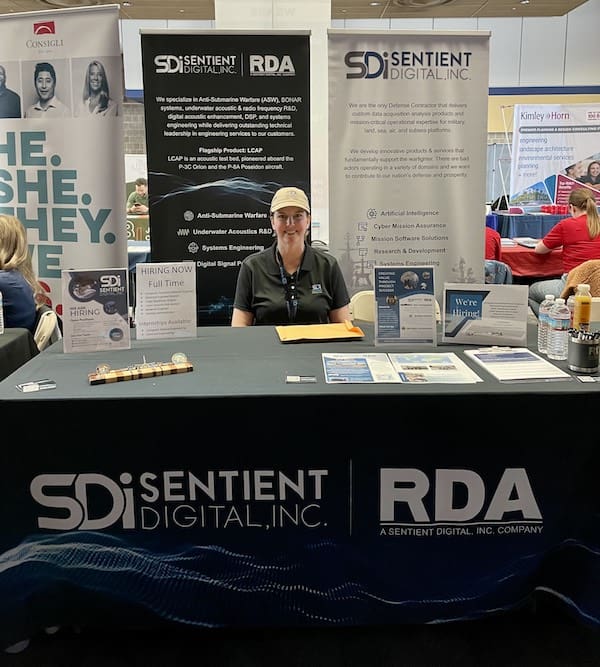
What Our Employees Thought of Their Overall Experience at Villanova’s Career Fairs
Sentient Digital’s Talent Acquisition Manager, Kathy Hinkle, discussed the mutuality of the discussions at the event. She noted that, “The RDA team and the students/candidates each did their homework and their preparation. They met as a team to see if they could establish a relationship that would benefit both parties, with the company gaining an intern or full-time employee, and the candidate having the opportunity to establish a rich and rewarding career that would dive into their passions and where they could find new areas of growth.”
RDA Advisory Systems Engineer Jon Stone felt that bringing a team of representatives including a recruiter as well as technical employees was beneficial. This “worked well to divide and conquer in terms of talking to the students/candidates. Kathy would start the initial conversation and pass them to Greg and Jon for them to answer questions about the projects they’ve worked on and their work experience. It was great to have a recruiter there and some technical workers. It gave Kathy a chance to meet with the candidates and then work with them afterwards to establish a good relationship.” Kathy agreed, noting that her primary role was to draw students to the table and she appreciated that Greg and Jon could share their passion for their highly technical work, such as RDA’s LCAP system.
As an Engineering Development Manager for RDA, Greg Niehaus explained what made students or candidates more likely to have a successful career fair experience. He felt that, “ The students/candidates that made good impressions were prepared to ask questions. They knew the right things to ask about and researched the company beforehand. They had their resumes ready to hand over to the recruiters, attentive listeners, and made very good first impressions.” Greg also noted that he hopes Sentient Digital and RDA will continue recruiting at Villanova, so attending these career fairs increased his enthusiasm for an ongoing partnership with the university.
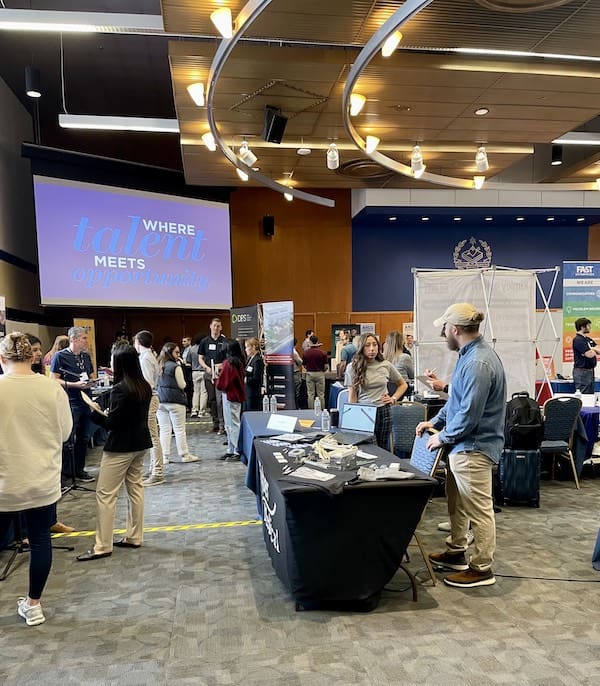
The Benefits of Participating in University Partnerships with Companies
There are many potential benefits of companies and universities creating partnerships, including some that are specific to technical employers. The most obvious benefit may be that universities can provide employers with a pool of highly skilled and motivated job candidates who are up to date with the latest knowledge in the field. Both Greg and Kathy were impressed with how well prepared the students and job candidates were to talk to them, and Kathy also noted that they had the soft skills needed to thrive at work as well. In turn, STEM employers can provide universities with opportunities for their students for hands-on training, research, and internship programs that expose students to the latest technological advancements and real-world challenges.
Assisting with Funding the Research Process
Another important benefit is for companies to contribute to the universities’ research efforts. Tech employers can fund research and development projects, providing universities a valuable source of revenue. Choosing how to distribute this funding can give companies the opportunity to promote a direction for research that will benefit the company. The result of these partnerships can be the creation of new technologies and products, as well as internships for students and job opportunities for graduates.
Helping Universities Know What Skills Employers Want
Partnering with companies benefits universities by helping them prepare their students for the job market. While working closely with tech employers, universities will identify new skills and knowledge that students will need to be successful in the workforce. This will allow universities to shape their programs accordingly. This collaboration can help ensure students are well-prepared when embarking on their first industry jobs. Giving students these skills and knowledge will allow them to make meaningful contributions to the industry. Meanwhile, employers need job candidates that are prepared to work, and universities need to have a high employment rate for their graduates, so this partnership has a clear benefit for all parties involved.
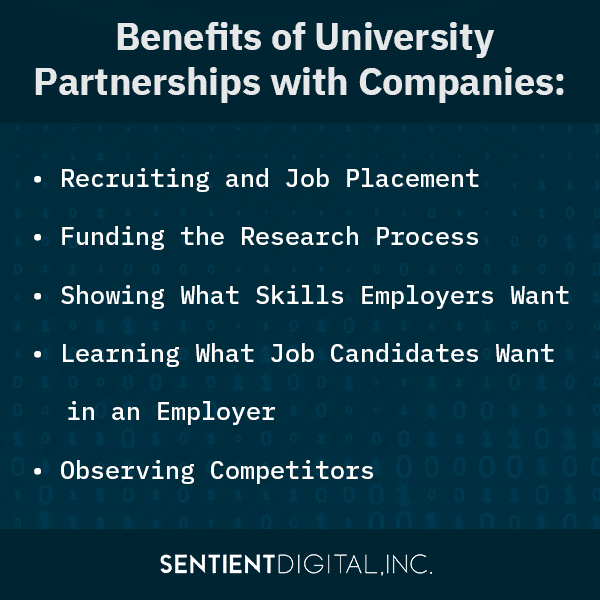
Learning What Potential Job Candidates Want in an Employer
For organizations, learning about job candidates is a logical benefit of universities partnering with companies for events such as career fairs. However, this can go beyond finding out what degree the students are pursuing and any previous work experience. Interacting with the student attendees can give you an idea of what potential job candidates, particularly for entry level jobs, are looking for in an employer. For example, both Kathy and Jon alluded to discovering that the students expressed interest in the idea of working for many years for the same employer.
Jon mentioned he was surprised that many students he spoke to expressed interest in his and Greg’s duration of working at RDA. With 15 years of experience, he described himself as a “short-timer,” in the sense that many RDA employees have been with the company even longer. Both he and Kathy noted that RDA and Sentient Digital are unusual in their industry in that employees tend to stay for a long time, whereas “job hopping” is common in the industry. This reflected well on Sentient Digital and RDA, and by talking with the students and other job candidates at this career fair, the employees now understood that this is a unique feature that recruiting efforts can focus on in the future.
Observing Potential Competitors
A less obvious benefit of participating in university partnerships with companies is the opportunity to learn about the other employers that may be your competition. Reflecting on the other employers he observed at the event, Greg noted that, “SDi/RDA is incredibly specialized compared to the other companies. There were big and small government agencies, others looking for civil workers, construction companies, consulting firms.” He concluded that due to RDA’s level of specialization, the other organizations that participated did not truly constitute competitors.
Keep Up with Sentient Digital and RDA for Advice for Employers and Job Candidates
Sentient Digital and RDA will continue to participate in events such as career fairs and industry-relevant presentations to contribute and to reap the benefits of university partnerships with companies. As we forge these partnerships, we gain perspective on our competition and the future workforce of our industry, while contributing to the university by providing opportunities for students to make connections in their chosen field.
As we continue to create innovative technology solutions for our clients, we also provide information for job seekers and employers on our blog. Job seekers can check out our advice for how to get a job in the tech sector and learn about Sentient Digital’s STEM internships. For employers, we recommend our blog about how we built our organizational culture and the unique ways we use employee feedback.
